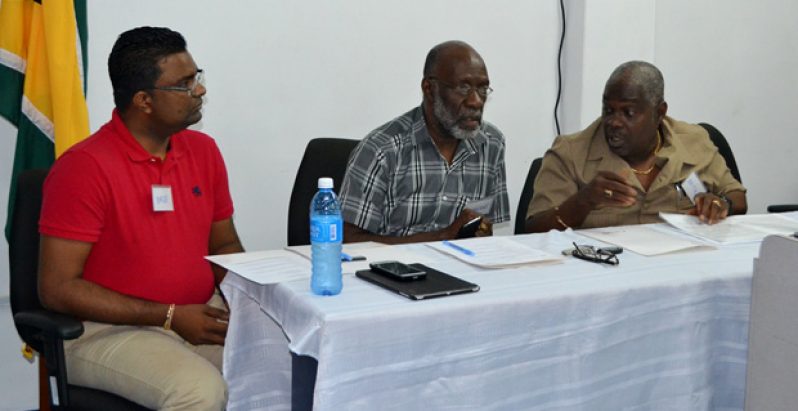– Chief Elections Officer
By Ariana Gordon
WHEN electors take to the polls on March 18, they would be voting to elect councilors, and not mayors, deputy mayors or chairmen of neighbourhood democratic councils (NDCs).The Chief Elections Officer (CEO) of the Guyana Elections Commission (GECOM), Mr Keith Lowenfield, made clear this point on Saturday at the opening of a two-day Local Government Elections training workshop for journalists, held at the Canadian International Development Agency (CIDA) in Georgetown.
In his presentation on Guyana’s Local Government System, Lowenfield explained the importance of understanding what posts are being elected through the Local Government Elections (LGE).
“The contestants, being political parties, voluntary groups and individuals, will be vying for the amount of seats in the context of Guyana. In every instance, the amount of seats on council will be twice the amount of the constituencies in the Local Authority Area,” he said.
GECOM’s CEO said if there are fifteen constituencies in one municipality, then the council of the specific municipality will have thirty councillors. He explained that the number of constituencies is not equal in each Local Authority Area (LAA) as the number of constituencies is dependent on the density of the population as well as its economic viability, among other factors.
He noted that each LAA will comprise a number of constituencies; as many as fifteen in some instances, and as low as three in other cases.
“The amount of constituencies equals twice the amount of councillors in that Local Authority Area,” Lowenfield declared. He explained that after the Councillors are identified, they will then meet based on a time frame to be established by the Ministry of Communities. GECOM will state in writing who the elected councillors for the LAA are, and (those councillors) will then meet among themselves and have an election for Chairman in the case of the NDC, or Mayor in the case of a municipality.
“So there is no arbitrariness. The elections are intended as prescribed, for councilors. Those councillors will make a determination as to who among them will be elected to be mayor and deputy mayor and other designations.”
“Local elections elect councillors,” GECOM’s CEO stressed.
The Guyana Press Association is holding this workshop, which is being funded by the Canadian High Commission.
Meanwhile Lowenfield, who was accompanied by his deputy Vishnu Persaud and GECOM’s Commissioners Sase Gunraj, Charles Corbin and Vincent Alexander, stressed the importance of journalists understanding the Local Government system.
Journalists from Georgetown, Linden, Berbice and Essequibo are attending the workshop. Lowenfield informed the gathering of media professionals that, in covering local elections, it is important to understand that there are three tiers of government, namely Central, Regional and Local; and
not all communities fall under the umbrella of NDCs and municipalities.
“There are parts of Guyana that are not covered under the NDC or municipality; GECOM will not be treating with areas outside,” he added, emphasizing that LGE are pan-Guyana and those areas that fall outside the NDCs and municipalities will not participate in the elections.
The Local Authorities (Elections) (Amendment) Act No. 26 of 2009 provides for Local Government Elections to be held in all of municipalities and NDCs in Guyana using a mixed electoral system of Proportional Representation and First-Past-the-Post.
50% or half of the number of Councillors of each municipality and NDC will be elected through the Proportional Representation component, and the other 50% through the First-Past-the-Post or Constituency component of the electoral system. As such, voluntary groups, political parties and individual candidates can contest for seats in the municipalities and NDCs.
It is important to note that only voluntary groups and political parties can contest in the Proportional Representation aspect of LGE. Both categories can contest any or all of the seats under the Constituency component of the elections. The candidates must be living in the constituency being contested.
Meanwhile, under the First-Past-The-Post component, an individual candidate can contest only for one seat in a single constituency in which he or she is registered and resides.
On day one of the workshop, journalists were briefed on the dos and don’ts of elections coverage and Local Government by President of the GPA, Neil Marks, and Vice President of the Association of Caribbean Media Workers (ACM), Dennis Chabrol.
The President of the Association of Caribbean Media Workers delivered a presentation on Governance in some Caribbean countries.
The training continues today.




.png)









